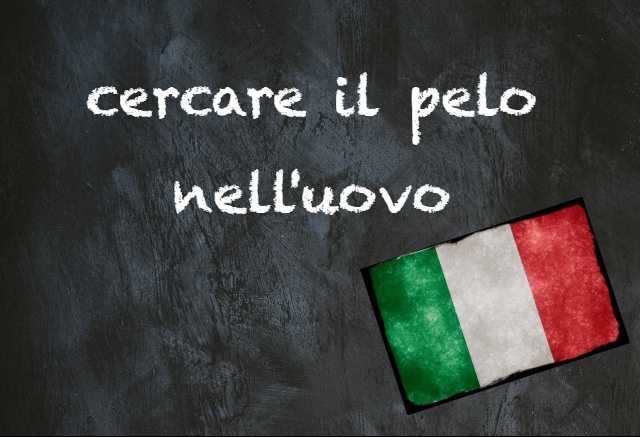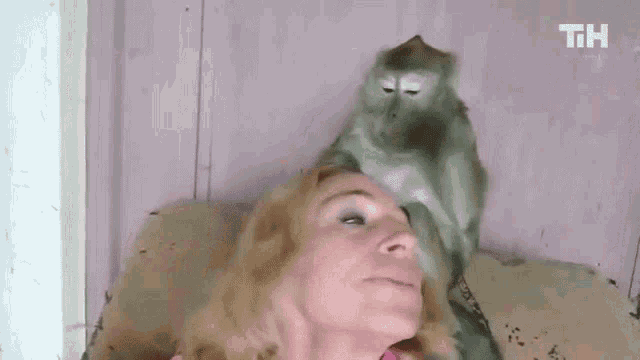
Italian expression of the day: ‘Cercare il pelo nell’uovo’

We all know that person who ‘looks for the hair in the egg’.
All cultures have their pedants – people who are so obsessively focused on finding faults in the details, they can’t see the big picture.
In English, we say such people ‘nit pick’. Nits (or headlice) are so small they’re hard to see without getting up invasively close, so it's not hard to see where the phrase originates.

In Italian, however, these quibblers engage in the less obvious activity of cercando il pelo nell’uovo – literally, looking for the hair in the egg.
Non cerchiamo il pelo nell'uovo.
Let’s not nit pick.
Se volete cercare il pelo nell'uovo, va bene.
If you want to split hairs, fine.
A hair is something you definitely wouldn’t want to see on the fried eggs in your full English, and if you’ve ever sat down to a hearty meal only to spy an appetite-killing strand draped across your plate, you might think such behaviour’s perfectly reasonable.

But to cercare il pelo nell’uovo is to look for a hair in an egg that’s still in its shell, so couldn’t possibly be there, either inside or on its smooth calcified surface.
Unlike nit-picking, where there’s a slim possibility you might find what you’re looking for if you search hard enough, you’re not going to find a hair inside your shell-covered egg – so the Italian makes especially clear that this is a pointless endeavour.
A variation on the phrase is trovare il pelo nell’uovo or find the hair in the egg – in essence, to find defects where there are none.
Sai che il nostro capo ama trovare il pelo nell'uovo.
You know our boss loves finding fault.
If you start to find yourself slipping into hair-scouting habits, try taking a leaf out of a different kind of Italian's book and start training yourself to be a bit more scialla.
Do you have an Italian word you’d like us to feature? If so, please email us with your suggestion.
Comments
See Also
All cultures have their pedants – people who are so obsessively focused on finding faults in the details, they can’t see the big picture.
In English, we say such people ‘nit pick’. Nits (or headlice) are so small they’re hard to see without getting up invasively close, so it's not hard to see where the phrase originates.

In Italian, however, these quibblers engage in the less obvious activity of cercando il pelo nell’uovo – literally, looking for the hair in the egg.
Non cerchiamo il pelo nell'uovo.
Let’s not nit pick.
Se volete cercare il pelo nell'uovo, va bene.
If you want to split hairs, fine.
A hair is something you definitely wouldn’t want to see on the fried eggs in your full English, and if you’ve ever sat down to a hearty meal only to spy an appetite-killing strand draped across your plate, you might think such behaviour’s perfectly reasonable.

But to cercare il pelo nell’uovo is to look for a hair in an egg that’s still in its shell, so couldn’t possibly be there, either inside or on its smooth calcified surface.
Unlike nit-picking, where there’s a slim possibility you might find what you’re looking for if you search hard enough, you’re not going to find a hair inside your shell-covered egg – so the Italian makes especially clear that this is a pointless endeavour.
A variation on the phrase is trovare il pelo nell’uovo or find the hair in the egg – in essence, to find defects where there are none.
Sai che il nostro capo ama trovare il pelo nell'uovo.
You know our boss loves finding fault.
If you start to find yourself slipping into hair-scouting habits, try taking a leaf out of a different kind of Italian's book and start training yourself to be a bit more scialla.
Do you have an Italian word you’d like us to feature? If so, please email us with your suggestion.
Join the conversation in our comments section below. Share your own views and experience and if you have a question or suggestion for our journalists then email us at [email protected].
Please keep comments civil, constructive and on topic – and make sure to read our terms of use before getting involved.
Please log in here to leave a comment.